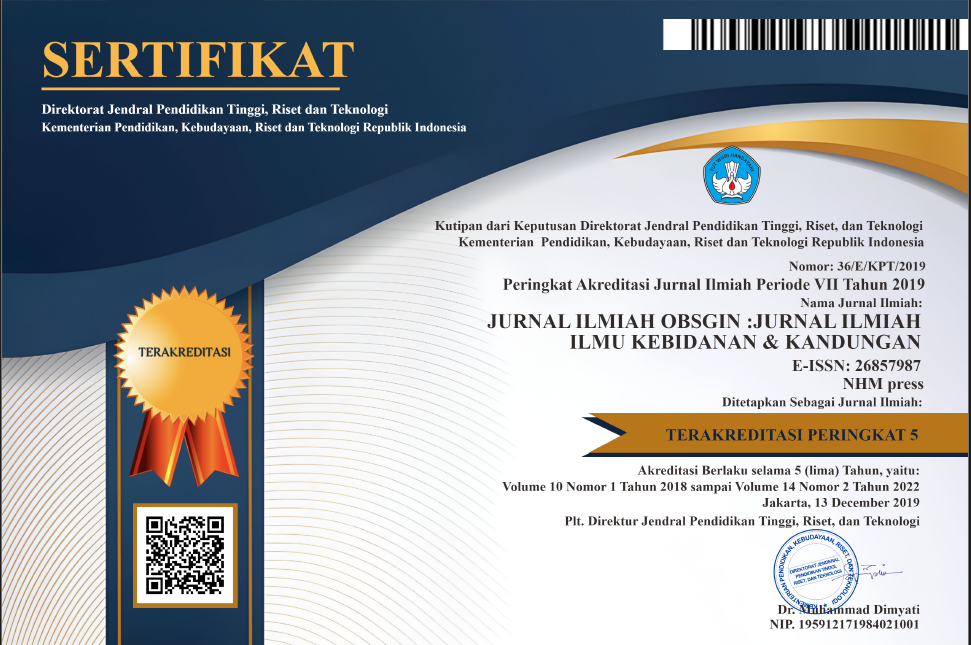HUBUNGAN DUKUNGAN KELUARGA DENGAN PEMBERIAN ASI EKSKLUSIF di RW 3 dan 4 KELURAHAN KEDUNG ASEM KECAMATAN WONOASIH KOTA PROBOLINGGO
Abstract
According to WHO data, Indonesia's exclusive breastfeeding coverage in 2022 was recorded at only 67.96%, down from 69.7% in 2021, indicating the need for more intensive support so that this coverage can increase. While a mother is breastfeeding, in order to achieve exclusive breastfeeding, the mother needs support, one of which is family support. Family support plays a very important role in the smooth process of breastfeeding and breastfeeding. The aim of the research was to determine the relationship between family support and exclusive breastfeeding in RW 3 and 4, Kedung Asem Village, Wonoasih District, Probolinggo City. The research design used a correlation study with a cross sectional approach. The research subjects were breastfeeding mothers who had babies aged 6-24 months. The sampling technique was simple random sampling with a total of 50 respondents. The research instrument was a questionnaire and data analysis used the chi square test. Based on research results, 18 mothers' families supported and provided exclusive breastfeeding. Based on the output results table, the value of Asymp. Sig (2-sided) in the person chi square test is 0.001. Due to the value of Adymp. Sig (2-sided) 0.001 <0.005, so based on the decision above, it can be concluded that Ho is rejected and Ha is accepted. There is a significant relationship between family support and exclusive breastfeeding based on the significance value of person chi square which is smaller than 0.05. Family support is related to the success of providing exclusive breastfeeding to babies, this is supported by family knowledge about good breastfeeding. Breastfeeding mothers need to increase their self-confidence and motivation in providing breast milk, increasing knowledge about correct breastfeeding through counseling in health care settings.
References
Donsu, dkk, 2017. Psikologi keperawatan. Yogyakarta : pustaka baru press
Friedman. (2018). Buku kedokteran. Jakarta : EGC
puspita sari, eka. (2017). Asuhan kebidanan masa nifas.jakarta:cv.trans info media.
Ratnasari, D., dkk. (2017). Family Support and Exclusive Breastfeeding among Yogyakarta Mothers in Employment. Asia Pacific Journal of Clinical Nutrition. 31-35.
WHO(2023) Bersama-sama, dukung ibu sukses menyusui dan bekerja. https://www.who.int/indonesia/news/events/world-breastfeeding-week/2023.Diakses tanggal 20 September 2023.
Aryotochter, A. A. M., Prameswari, G. N., Azinar, M., Fauzi, L., & Nugroho, E. (2018). Association between Exclusive Breastfeeding with Health Belief Model in Working Mothers. Indian Journal of Public Health Research & Development, 9(12).
Ulfah (2022). Hubungan Dkungan BIdan dan Dukungan Keluarga Terhadap Pemberian ASI Eksklusif di Wilayah Kerja Puskesmas Umbulharjo I Kota . Jurnal Universitas Aisyiyah Yogayakarta (12).
Enisah (2022) Hubungan Pengetahuan dan dukungan Keluargadengan Pemberian ASI Eksklusif di Desa Sayur Kecamatan Barumun Selatan Kabupaten Padang Lawas .Jurnal Universitas Aufa Royhan.
Laela(2017). Hubungan Dukungan Keluarga Terhadap ASI Eksklusif dengan Pemberian MP-ASI pada Ibu Bekerja di Desa Rembes Kecamatan Bringin Kabupaten.Jurnal Universitas Diponegoro.
Suharti J.F(2018) Hubungan Dukungan Keluarga Dengan Pemberian ASI Eksklusif pada Bayi Di Puskesmas Ranotana Weru.Jurnal Universitas Sam Ratulangi
Vera Mei Kartika,dkk(2017).Hubungan Dukungan Keluarga dengan Keberhasilan Pemberian ASI Eksklusif pada Ibu Bekerja di Wilayah Kerja Puskesmas Bringin Kabupaten Semarang.Jurnal Institut Teknologi Bisnis Dan Kesehatan Bhakti Putra Bangsa Indonesia
Kinanti Pinta Karana(2022).Pekan Menyusui Sedunia. https://www.unicef.org/indonesia/id/siaran-pers/pekan-menyusui-sedunia-unicef-dan-who-serukan-dukungan-yang-lebih-besar-terhadap.Diakses tanggal 20 September 2023.











